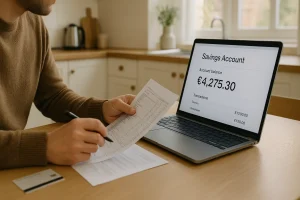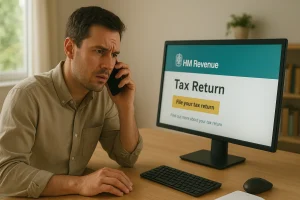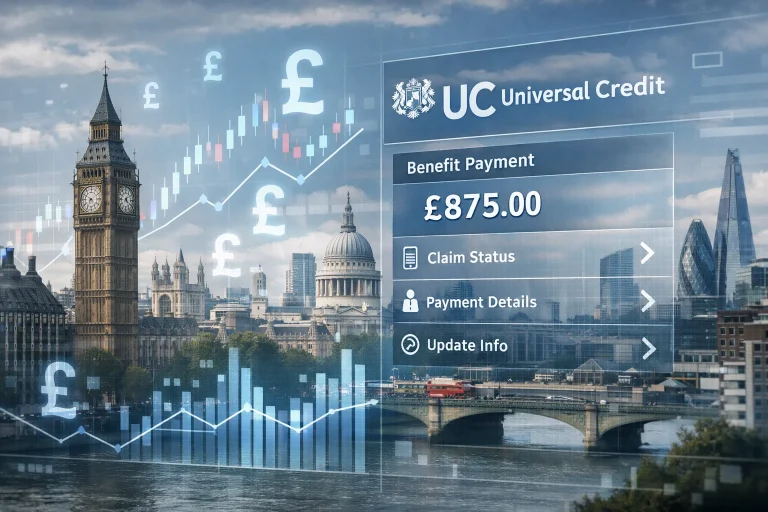Have you ever wondered whether you need to tell HMRC about the interest you earn from your savings? With interest rates climbing in the UK, many people are discovering that their savings now generate more income than before.
Understanding whether you must declare this interest to HMRC can seem confusing, especially with multiple allowances and exemptions to consider. The rules vary depending on how much you earn, your tax band and whether you already complete a Self Assessment tax return.
This guide breaks down how savings interest is taxed, when you need to take action and when HMRC does the work automatically. By the end, you’ll know exactly when to report savings interest and how to stay compliant while maximising your tax‑free allowances.
What Counts as Savings Interest in the UK?

Savings interest is the income you receive from holding money in an account or investment that pays interest over time. It covers earnings from traditional bank and building society savings accounts, credit union accounts, and fixed‑term bonds.
It also includes interest from peer‑to‑peer lending platforms, corporate or government bonds and some life insurance contracts. Even compensation such as Payment Protection Insurance (PPI) interest may fall within taxable savings income.
Interest from Individual Savings Accounts (ISAs) and certain National Savings & Investments (NS&I) products is tax‑free and does not count toward your Personal Savings Allowance. For joint accounts, HMRC assumes the interest is split equally between account holders unless you notify them otherwise.
Understanding what counts as taxable interest ensures you report income correctly and avoid accidental non‑compliance. Whether you’re saving for a home, retirement or just building an emergency fund, recognising taxable versus non‑taxable savings interest is essential for accurate tax reporting in the UK.
How Much Interest Can You Earn Without Paying Tax?
Not all the interest you earn from your savings is subject to tax. The UK tax system offers several allowances that enable you to receive a portion of savings interest tax-free. These allowances are based on your overall income and which income tax band you fall into.
- Personal Allowance: For the 2024/25 tax year, every individual in the UK has a tax-free income allowance of £12,570. If your total income is below this amount, you won’t pay any income tax at all. Any unused portion of this allowance can also be used to cover savings interest.
- Starting Rate for Savings: If your non-savings income is less than £17,570, you may qualify for an additional allowance of up to £5,000 in tax-free savings interest. However, this allowance reduces by £1 for every £1 your income exceeds the Personal Allowance of £12,570.
- Personal Savings Allowance (PSA): Depending on your income tax band, you can also earn tax-free interest under the PSA, as shown below.
Personal Savings Allowance Table:
| Tax Band | Income Tax Rate | Tax-Free Savings Interest (PSA) |
| Basic-rate taxpayer | 20% | £1,000 |
| Higher-rate taxpayer | 40% | £500 |
| Additional-rate taxpayer | 45% | £0 (No PSA) |
These combined allowances mean that most people in the UK won’t pay any tax on their savings interest, unless it exceeds the total of the applicable allowances.
For instance, a basic-rate taxpayer could earn up to £1,000 in interest without paying tax. If your interest goes over these limits, the excess amount is taxed at your usual income tax rate. Knowing these thresholds is essential for effective savings management and avoiding unexpected tax bills.
When Do You Need to Notify HMRC About Your Savings Interest?

Understanding when to notify HMRC about your savings interest is key to avoiding penalties and ensuring you stay tax-compliant. In many cases, HMRC already receives this information, but there are situations where you must report it yourself.
Do You Need to Notify HMRC if You’re Employed or Get a Pension?
If you’re employed or receive a pension, you generally don’t need to notify HMRC about your savings interest manually. Banks and financial institutions report this information directly to HMRC at the end of each tax year.
HMRC then uses this data to estimate your tax liability and adjust your tax code accordingly. If you earn interest within your Personal Savings Allowance, no action is needed.
However, if your total interest is high enough to result in tax being owed, HMRC will reflect this by adjusting your tax code and collecting the tax through your salary or pension.
Do Banks Automatically Report Savings Interest to HMRC?
Yes, all UK banks, building societies, and financial institutions are legally required to report the amount of interest they pay to customers to HMRC.
This means HMRC is usually aware of your savings income without you needing to submit anything separately. This system was introduced in April 2016 when banks began paying gross interest, without deducting tax.
The shift to gross interest made it your responsibility to ensure any necessary tax is paid, but HMRC uses bank-reported data to help automate this process.
What if Your Interest Exceeds Your Tax-free Allowance?
If your interest exceeds your PSA or you are not eligible for it, such as an additional-rate taxpayer, you may owe tax.
How this is handled depends on your income and tax circumstances:
- If you’re employed, HMRC will likely adjust your tax code.
- If you’re self-employed or have multiple income sources, you may need to report the interest in a Self Assessment tax return.
- If you’re not in PAYE or Self Assessment systems, HMRC may issue a P800 or Simple Assessment letter explaining how much tax you owe and how to pay it.
Knowing your status helps you avoid underreporting and future penalties. It’s always wise to keep track of how much interest you’re earning annually, even if you believe it’s within your tax-free limits.
Do You Need to Report Savings Interest in a Self Assessment?
You may need to report savings interest in a Self Assessment tax return, depending on your total income and how much interest you earn annually.
HMRC requires individuals to declare all sources of income in their Self Assessment, even interest earned within your Personal Savings Allowance.
If your savings and investment income is over £10,000 in a tax year, you must register for Self Assessment and report it through your annual return.
Even if the interest itself is not taxable due to allowances, HMRC still requires you to include it. This applies whether you’re self-employed, a landlord, or have multiple income streams.
For those already in the Self Assessment system, you should include all interest earned in the section for savings and investments.
This includes interest from:
- Bank and building society savings
- Bonds
- Credit union accounts
- Peer-to-peer lending
- Any other taxable sources
If your savings interest is below the PSA and you’re not required to file a tax return for any other reason, you typically don’t need to notify HMRC.
But always double-check your annual interest total, especially as interest rates increase, because even modest savings balances may now generate taxable returns. It’s your responsibility to track your earnings and report accurately if required.
How Does HMRC Collect Tax on Your Savings Interest?

Once HMRC knows how much interest you’ve earned, it uses different methods to collect any tax due depending on your circumstances. In most cases, this process happens automatically.
For individuals who are employed or receive a pension, HMRC uses data from your bank or financial institution to estimate your savings income.
If you’ve earned interest above your Personal Savings Allowance or if you don’t qualify for an allowance, HMRC will adjust your tax code.
This means the extra tax is collected through your salary or pension over the following tax year. You’ll notice a change in your tax code if this happens, which may result in slightly less net pay each month.
If you’re self-employed or have already completed a Self Assessment tax return, you’re responsible for reporting the exact amount of savings interest on your return.
HMRC calculates the tax due along with the rest of your income tax liability, which you pay when settling your Self Assessment bill.
If you’re not employed, self-employed, or part of the PAYE system, and HMRC identifies tax is owed, you’ll typically receive a P800 tax calculation or a Simple Assessment letter.
These notices show how much interest was reported and explain how much tax you owe and how to pay it. Knowing how tax is collected allows you to avoid unpleasant surprises and ensure you’re budgeting for any liability that might arise.
What If You Forget to Tell HMRC About Savings Interest?
Forgetting to inform HMRC about your savings interest could lead to penalties, especially if tax is due. Although financial institutions report your interest to HMRC automatically, the responsibility still lies with you to ensure everything is correctly declared, particularly if you’re earning above your allowances or fall outside PAYE.
If you’re not in a Self Assessment scheme and don’t receive a tax code adjustment or a P800 from HMRC by the end of the tax year (31 March), you must contact HMRC proactively. You can call them or use their online services to review your income and check if tax is owed.
Failing to declare taxable interest can result in backdated tax demands, late payment penalties and interest charges. However, HMRC is generally more lenient with those who voluntarily correct mistakes.
It’s always safer to be upfront and check whether action is needed. Keeping a record of your annual interest earnings and reviewing your allowances helps prevent these situations altogether.
Can You Reclaim Overpaid Tax on Your Savings Interest?
Yes, if you’ve overpaid tax on your savings interest, you can reclaim it, but only within a specific timeframe. If your interest was below your Personal Allowance or Personal Savings Allowance and tax was still deducted or collected, you’re entitled to a refund.
For those completing Self Assessment tax returns, overpaid tax is typically refunded when your return is processed.
If you don’t file a Self Assessment, you can reclaim using form R40, available from HMRC’s website. This form allows you to request a refund for overpaid tax on bank interest and other savings income.
You must make a claim within four years from the end of the relevant tax year. So, if you paid too much in the 2020/21 tax year, you have until April 2025 to submit a reclaim.
Being aware of your tax-free thresholds and regularly checking your bank interest statements can ensure you don’t miss out on a refund you’re legally entitled to receive.
How Can You Legally Avoid Paying Tax on Savings Interest?

Even with allowances in place, it’s natural to want to legally minimise or avoid paying tax on your savings interest. The UK tax system offers a few legitimate ways to do just that.
Are ISAs Completely Tax-free?
Yes, interest earned from money held in an Individual Savings Account (ISA) is completely tax-free. This includes Cash ISAs, Stocks and Shares ISAs, and Innovative Finance ISAs.
Interest earned within these accounts does not count towards your Personal Savings Allowance, meaning it won’t trigger tax liability even if your savings grow significantly.
What Are the Current ISA Limits?
For the 2024/25 tax year, you can save up to £20,000 across all types of ISAs combined. You can split this allowance between different ISA types, such as putting part into a Cash ISA and part into a Stocks and Shares ISA. As long as you stay within the limit, all your earnings within the ISA wrapper are protected from income tax.
Can Children’s Savings Accounts Be Taxed?
Yes, children have their own Personal Allowance. Interest from savings in a child’s account is usually tax-free if it stays below that allowance.
However, if a child earns more than £100 in interest from money given by a parent, the entire amount is treated as the parent’s income for tax purposes. This rule doesn’t apply to money gifted by grandparents or placed into Junior ISAs, which are also tax-free.
Using ISAs, managing gifts to children wisely and staying within annual allowances are simple and legal ways to reduce or eliminate tax on your savings interest.
Who Needs to Notify HMRC?
It’s not always easy to know whether you should report savings interest to HMRC. While much of the process is automatic, there are scenarios where you are responsible for informing them directly. The table below summarises who needs to notify HMRC and when.
Understanding these cases helps ensure you don’t accidentally under-report or ignore an obligation to declare your interest income.
| Your Situation | Do You Need to Notify HMRC? | How It’s Reported or Collected |
| Employed, interest below PSA | No | HMRC adjusts tax code automatically |
| Employed, interest above PSA | Not directly, but check for P800 letter | Tax collected via PAYE through revised tax code |
| Self-employed, any savings interest | Yes | Must declare in Self Assessment return |
| Total savings interest over £10,000 | Yes | Must register and file Self Assessment |
| Interest from ISAs only | No | ISAs are tax-free and exempt from reporting |
| Not employed or self-employed | Maybe | HMRC may issue P800 or Simple Assessment based on bank data |
| Overpaid tax on savings interest | Yes | Must submit form R40 or claim via Self Assessment |
Always keep a record of your interest earnings, especially as rates rise, to determine if you fall into any of the categories above.
Conclusion
In today’s financial climate, it’s increasingly common for savers to earn enough interest to trigger a tax obligation. While banks and HMRC handle much of the reporting automatically, it’s still your responsibility to ensure everything is correctly declared, especially if your income crosses tax-free thresholds.
Knowing when to act, what to track, and how to report or reclaim tax can make a big difference in staying compliant and avoiding unnecessary penalties.
By understanding how the Personal Allowance, the PSA, and other rules apply to your specific financial situation, you can manage your savings more effectively.
Whether you’re new to saving or have significant investments, a little knowledge goes a long way in ensuring you’re not paying more tax than necessary, or worse, not enough.
FAQs
What is the Personal Savings Allowance?
The Personal Savings Allowance lets you earn a certain amount of interest tax-free, depending on your income tax band. Basic-rate taxpayers get £1,000, higher-rate get £500, and additional-rate taxpayers get none.
Is savings interest always taxable in the UK?
No, savings interest is not always taxable. If it falls within your Personal Allowance, PSA or Starting Rate for Savings, you don’t owe tax.
Do I report savings interest from ISAs?
No, interest earned from ISAs is tax-free and does not need to be reported to HMRC. It’s completely exempt from UK income tax rules.
Can HMRC change my tax code due to savings interest?
Yes, if you earn interest above your allowance, HMRC may adjust your tax code to collect the owed tax. This usually happens automatically if you’re employed or receive a pension.
Do I need to complete Self Assessment just for bank interest?
Only if your total savings income exceeds £10,000 or you’re already in Self Assessment. Otherwise, you generally don’t need to register just for interest alone.
What happens if I don’t declare taxable interest?
HMRC may issue a P800 or Simple Assessment to collect unpaid tax. You could also face penalties if they discover the underpayment wasn’t disclosed.
How can I reclaim overpaid savings tax?
You can use form R40 or claim through your Self Assessment return. Claims must be made within four years of the end of the tax year.
{
“@context”: “http://schema.org/”,
“@type”: “FAQPage”,
“mainEntity”: [
{
“@type”: “Question”,
“name”: “What is the Personal Savings Allowance?”,
“acceptedAnswer”: {
“@type”: “Answer”,
“text”: “The Personal Savings Allowance lets you earn a certain amount of interest tax-free, depending on your income tax band. Basic-rate taxpayers get £1,000, higher-rate get £500, and additional-rate taxpayers get none.”
}
},
{
“@type”: “Question”,
“name”: “Is savings interest always taxable in the UK?”,
“acceptedAnswer”: {
“@type”: “Answer”,
“text”: “No, savings interest is not always taxable. If it falls within your Personal Allowance, PSA or Starting Rate for Savings, you don’t owe tax.”
}
},
{
“@type”: “Question”,
“name”: “Do I report savings interest from ISAs?”,
“acceptedAnswer”: {
“@type”: “Answer”,
“text”: “No, interest earned from ISAs is tax-free and does not need to be reported to HMRC. It’s completely exempt from UK income tax rules.”
}
},
{
“@type”: “Question”,
“name”: “Can HMRC change my tax code due to savings interest?”,
“acceptedAnswer”: {
“@type”: “Answer”,
“text”: “Yes, if you earn interest above your allowance, HMRC may adjust your tax code to collect the owed tax. This usually happens automatically if you’re employed or receive a pension.”
}
},
{
“@type”: “Question”,
“name”: “Do I need to complete Self Assessment just for bank interest?”,
“acceptedAnswer”: {
“@type”: “Answer”,
“text”: “Only if your total savings income exceeds £10,000 or you’re already in Self Assessment. Otherwise, you generally don’t need to register just for interest alone.”
}
},
{
“@type”: “Question”,
“name”: “What happens if I don’t declare taxable interest?”,
“acceptedAnswer”: {
“@type”: “Answer”,
“text”: “HMRC may issue a P800 or Simple Assessment to collect unpaid tax. You could also face penalties if they discover the underpayment wasn’t disclosed.”
}
},
{
“@type”: “Question”,
“name”: “How can I reclaim overpaid savings tax?”,
“acceptedAnswer”: {
“@type”: “Answer”,
“text”: “You can use form R40 or claim through your Self Assessment return. Claims must be made within four years of the end of the tax year.”
}
}
]
}







